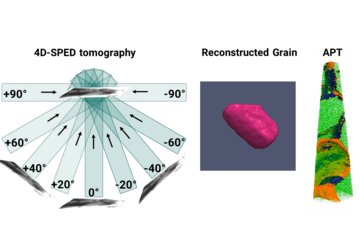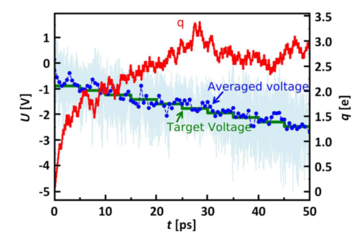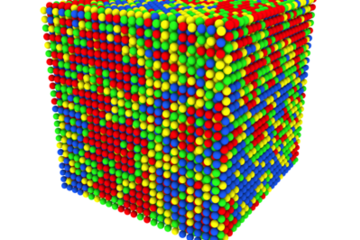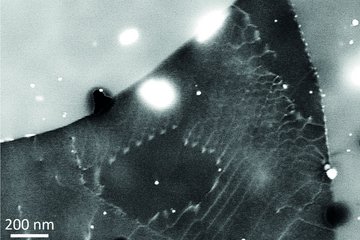All genres
141.
Talk
Arthropod cuticle: A biological multi-functional composite used as template for nano-to-macro-scale hierarchical modeling. Multiscale Materials Modeling, Freiburg, Germany (2010)
142.
Talk
Design principles of Arthropod cuticle evaluated experimentally and by ab initio-basedmultiscale simulations. Ringberg Symposium 2010, Molecular Bionics - From Biomineralization to Functional Materials, Ringberg Castle, Rottach-Egern, Germany (2010)
143.
Talk
Combining ab-initio based multiscale models and experiments for structural alloy design. Colloquium Lecture, Australian Microscopy & Microanalysis Research Facility, The University of Sydney, Sydney, Australia (2010)
144.
Talk
Ab initio based multi-scale approaches to the elasticity of polycrystals. ICAMS Scientific Retreat, Akademie Biggsee, Attendorn, Germany (2010)
145.
Talk
First-principles study of the Ti-Fe eutectic system. Seminar at Institute of Physics of Materials at Czech Academy of Sciences, Brno, Czech Republic (2010)
146.
Talk
Mechanical size effect analysis in metals and biological materials. Invited keynote lecture, Micromechanics Conference II, Oxford, UK (2010)
147.
Talk
First-principles study of the Ti-Fe eutectic system. Materials Science and Engineering 2010, Darmstadt, Germany (2010)
148.
Talk
Ab Initio Study of Elastic Properties in Fe3Al-Based Alloys. MSE 2010, Darmstadt, Germany (2010)
149.
Talk
Ab initio based study of multi-scale elastic properties of hierarchical biocomposites. Seminar talk at Masaryk University, Brno, Czech Republic (2010)
150.
Talk
Ab initio analysis of the carbon solubility limits in various iron allotropes. DPG Frühjahrstagung 2010, Regensburg, Germany (2010)
151.
Talk
Spin-polarization-induced structural selectivity in substituted Laves phases. DPG Frühjahrstagung 2010, Regensburg, Germany (2010)
152.
Talk
Atomic-scale quantification of solution hardening mechanisms. DPG Frühjahrstagung 2010, Regensburg, Germany (2010)
153.
Talk
First principles study of thermodynamic, structural and elastic properties of eutectic Ti-Fe alloys. DPG Spring Meeting 2010, Regensburg, Germany (2010)
154.
Talk
Spin-polarization-induced structural selectivity in substituted Laves phases. APS March Meeting 2010, Portland, OR, USA (2010)
155.
Talk
First principles study of thermodynamic, structural and elastic properties of eutectic Ti–Fe alloys. March meeting of the American Physical Society (APS), Portland, OR, USA (2010)
156.
Talk
Fundamental Materials-Design Limits in Ultra Light-Weight Mg-Li Alloys Determined from Quantum-Mechanical Calculations. 139th Annual Meeting of the Minerals, Metals and Materials Society (TMS), Seattle, WA, USA (2010)
157.
Talk
Ab Initio Determination of Phase-Field Parameters Needed for Scale-Bridging Studies of Nucleation and Microstructure Formation in the Ti-Fe Eutectic System. 139th Annual Meeting of the Minerals, Metals and Materials Society (TMS), Seattle, WA, USA (2010)
158.
Talk
Ab Initio Study of Extreme Loading Conditions in Transition-Metal Disilicides with the C40 Structure. 139th Annual Meeting of the Minerals, Metals and Materials Society (TMS), Seattle, WA, USA (2010)
159.
Talk
Arthropod Cuticle: A Biological Multifunctional Composite Used As Template for Multidisciplinary Nano-To-Macro-Scale Hierarchical Modeling. 139th Annual Meeting of the Minerals, Metals and Materials Society (TMS), Seattle, WA, USA (2010)
160.
Talk
Experimental Investigations of the Ti-Fe-Eutectic System Needed for the Further Understanding of the Microstructural Evolution in an Eutectic Alloy at Different Cooling Rates. 139th Annual Meeting of the Minerals, Metals and Materials Society (TMS), Seattle, WA, USA (2010)











